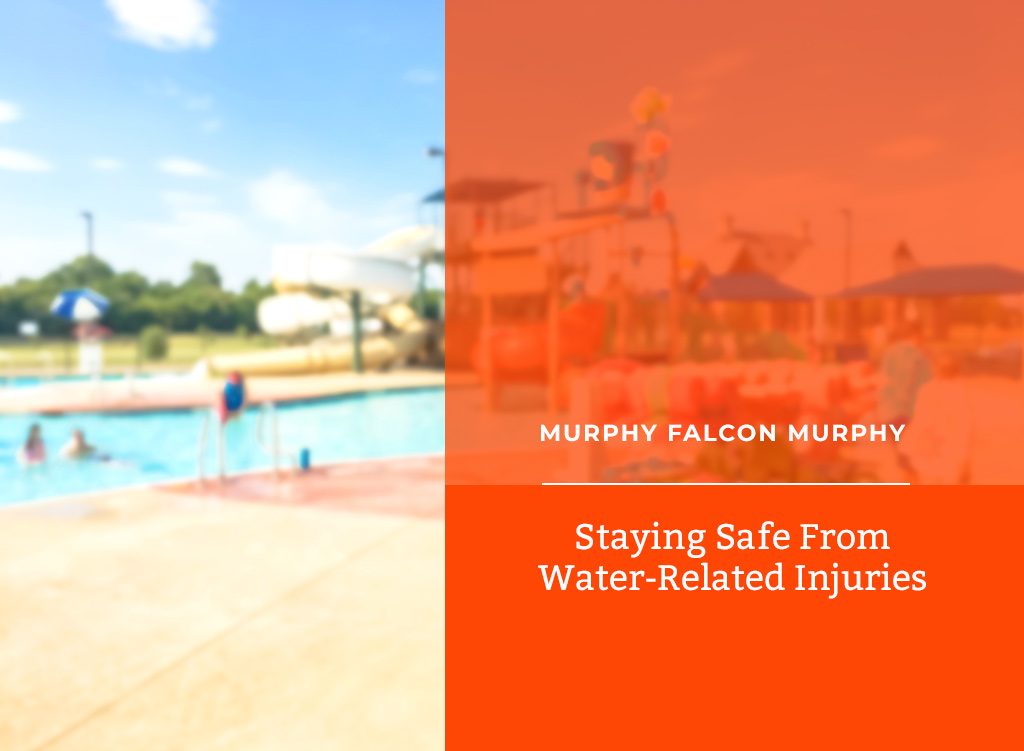Staying Safe From Water-Related Injuries
 Humans have always been attracted to bodies of water. Cities rise along the banks of great rivers, families vacation at the beach, and people get pools installed in their backyards. Water sustains us and entertains us, and as long as we need water to survive, we will continue to live alongside it.
Humans have always been attracted to bodies of water. Cities rise along the banks of great rivers, families vacation at the beach, and people get pools installed in their backyards. Water sustains us and entertains us, and as long as we need water to survive, we will continue to live alongside it.
However, water can also be dangerous, and water-related injuries can result in high hospital bills and lasting health challenges. If you or your loved one has sustained a water-related injury, it’s important to speak with an experienced personal injury attorney who can help you understand your legal options.
At Murphy Falcon & Murphy in Baltimore, our personal injury lawyers have helped many families obtain justice and compensation in personal injury claims regarding water-related injuries. If you would like to speak with us about your case, then please contact us to set up your free initial consultation.
Types of Water-Related Injuries
Why is water dangerous? There are several ways in which a person may be injured while in, on, or around water. They include:
- Trauma injuries related to accidents with boats or other watercraft
- Injuries from exposure to marine life including sharks, rays, and jellyfish
- Illness from exposure to bacteria or parasites present in some bodies of water
- Slip-and-fall injuries sustained after slipping on a wet surface
- Near-drowning injuries involving hypoxia in the brain tissue
- Unintentional drowning, which may constitute wrongful death
Where Do Water-Related Injuries Occur?
Water-related injuries can occur anywhere water is present, especially in and around:
- Oceans and seas
- Lakes and ponds
- Water parks
- Private pools
- Splash pads
- Water slides
- Diving boards
- Bathtubs
Unintentional Drowning Is A Leading Cause of Death
According to the U.S. Centers for Disease Control and Prevention, about ten people die from unintentional drowning every day. Of these ten, two are children below the age of 14. In the United States, drowning is the second leading cause of injury death for children between the ages of 1 and 14, and it ranks in the top 10 leading causes of death for children in every region of the world.
Adults are also vulnerable to unintentional drowning. Across all age groups, drowning is the fifth leading cause of unintentional injury death in the United States.
In some cases, a drowning accident may justify a wrongful death lawsuit. If you would like to know more about whether your unique case constitutes this, please contact our wrongful death attorneys to schedule a free consultation.
The top risk factors for drowning include:
- Inability to swim
- Lack of barriers around bodies of water
- Lack of close supervision
- Failure to wear life jackets
- Alcohol use
Near-Drowning Injuries Can Be Very Dangerous
Near-drownings, though not fatal, can still be very dangerous. More than 50% of drowning victims who are treated in emergency rooms require hospitalization or transfers for further intensive care, compared to a 6% hospitalization rate for all unintentional injuries.
Nearly drowning can lead to lifelong health challenges due to the effects of hypoxia (lack of oxygen) on the brain. When brain tissue is cut off from an oxygen supply, it may die, leading to a range of long-term health issues like memory problems, learning disabilities, and even loss of basic motor functions. Typically speaking, the longer the brain is without oxygen, the worse the damage becomes.
Keeping Children Safe From Water-Related Injuries
Children may be especially vulnerable to water-related injuries, including in the home. Bathtubs, toilets, and even small pools or puddles of water can pose a risk.
There are several things you can do to prevent your child from being injured:
- Teach children how to swim.
- Teach children to practice awareness of their surroundings at all times.
- Have children wear life jackets on or around large bodies of water.
- Monitor water sources around your home, and fence off areas of accumulated water, including wells, cisterns, hot tubs, spas, and personal pools.
- Invest in current CPR and first aid certifications so that you are qualified to help in an emergency.
Keeping Yourself Safe From Water-Related Injuries
It’s also important to protect yourself against water-related injuries. Use common sense and caution when in or around water, and make sure to:
- Learn how to swim and tread water for long periods of time.
- Wear life jackets when boating or using other watercraft.
- Never mix alcohol and boating or swimming.
- Don’t run on wet surfaces.
Speak With a Baltimore Personal Injury Lawyer Today
Sometimes, water-related injuries happen because of someone else’s negligence. If you or your loved one were involved in an accident that caused a water-related injury, then please contact our personal injury law firm to schedule your free initial consultation today. Our personal injury attorneys can help you build a strong legal case and fight for justice and compensation. Get started now by giving us a call.
